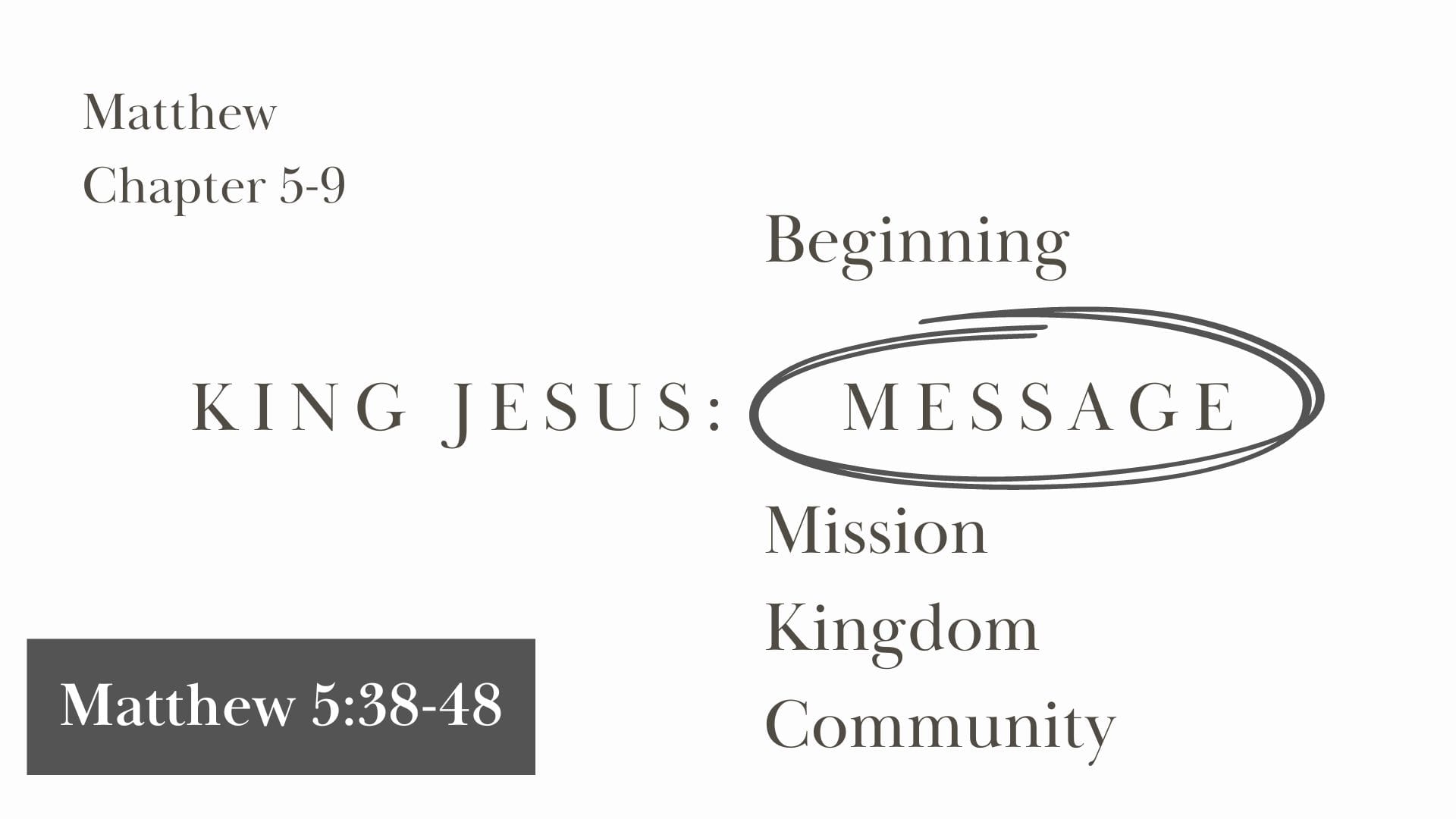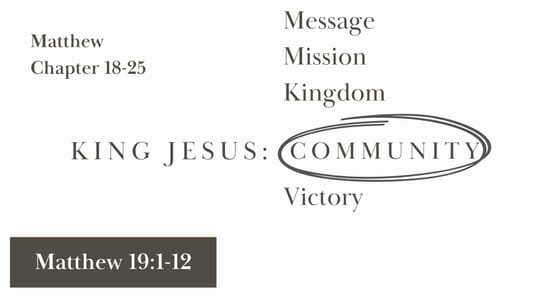Text:
You have heard the law that says the punishment must match the injury: ‘An eye for an eye, and a tooth for a tooth.’ But I say, do not resist an evil person! If someone slaps you on the right cheek, offer the other cheek also. If you are sued in court and your shirt is taken from you, give your coat, too. If a soldier demands that you carry his gear for a mile, carry it two miles. Give to those who ask, and don’t turn away from those who want to borrow.” You have heard the law that says, ‘Love your neighbor’ and hate your enemy. But I say, love your enemies! Pray for those who persecute you! In that way, you will be acting as true children of your Father in heaven. For he gives his sunlight to both the evil and the good, and he sends rain on the just and the unjust alike. If you love only those who love you, what reward is there for that? Even corrupt tax collectors do that much. If you are kind only to your friends, how are you different from anyone else? Even pagans do that. But you are to be perfect, even as your Father in heaven is perfect.
The foundation of the Kingdom of God is an unshakable JOY that GROWS from the bottom up.
Overall Commentary: 🌎
Today’s text is the last two of 6 statements made by Jesus concerning our actions toward others. Jesus has followed the same pattern of quoting an Old Testament command, providing the practical application, then giving illustrations on how it should be carried out. These final two have a common thread: offenses. For the crowd, this might have been the one they had been waiting on. We often tend to minimize what we do and maximize what has been done to us. This is normal. However, Jesus offers us an even better way when vengeance is possible. We may not immediately like it, but we can experience ultimate freedom if we do things His way.
Jesus says unshakable joy grows when we accept responsibility for HOW WE RESPOND TO OFFENSES.

Verse 38-42: Unshakable joy grows as I respond by partnering with God in justice and mercy.
Cross-references: Leviticus 24:19-20, Deuteronomy 19:21, Exodus 21:22-27, 1 Thessalonians 5:15, 1 Peter 3:9, Proverbs 20:22
Verse 38
Jesus quotes another text from the Old Testament. This time it is the book of Leviticus. This text is often used to say we can seek vengeance upon our neighbor when we have been offended. It was quite the opposite. This text was initially given to provide boundaries. Instead of killing someone, the punishment had to fit the crime. Also, it took the vengeance out of the hands of the individual and into the hands of the assembly. This way, the condemned person would have a better chance of being treated fairly. Jesus takes it even higher by saying, “Do not resist an evil person.” The word “resist” means to stand against. The idea is not to seek ultimate punishment. The idea here is to seek what is fair, but not all that is possible. He is seeking to temper our hearts when offended. Afterward, Jesus shows us how to provide justice properly.
In the book of Romans, Paul accurately describes the heart behind what Jesus is going to explain:
(Romans 12:19-21) Dear friends, never take revenge. Leave that to the righteous anger of God. For the Scriptures say, “I will take revenge; I will pay them back,” says the Lord. Instead, “If your enemies are hungry, feed them. If they are thirsty, give them something to drink. In doing this, you will heap burning coals of shame on their heads.” Don’t let evil conquer you, but conquer evil by doing good.
Here is the bottom line- God will take care of justice. We can trust that justice will be served at the right time. Therefore, we can offer mercy within boundaries when we know justice will be done. Here are the opportunities God gives us when we partner with God and trust His ultimate justice.
Verse 39
When insulted, I can stand in confidence. This text has long been used to justify Christians getting beat up. That is not what this text is implying. There is no place in Scripture where God says we cannot defend ourselves or others from physical violence. In the culture of the time, being slapped across the face with an open hand was the ultimate sign of disrespect. You could be taken before a court and heavily fined. Jesus is saying when someone disrespects you, do not take the shame they offer. Stand there and be so secure in yourself that you do not accept their shame. You stand in confidence because you know whose you are and are not ashamed. The idea is that no one can make you feel bad without your permission. Through Christ, our identity is already defined, so we do not live for the approval of others.
Verse 40
When wrong, I can make things right.
- Shirt- At the time, most people had multiple shirts, often used as bartering tools.
- Coat- Many people, especially the poor, only had one coat, and it often doubled as a blanket at night. It was considered illegal to require someone’s coat because it was likely the only one they had. It was a shame for someone to be without their coat.
In today’s culture, people get sued all the time. In the time of Jesus, frivolous court cases were rare. Therefore, someone being taken to court likely meant you had earned it. Jesus says when someone has something against you, and they are correct, do what you can to restore the relationship. Jesus says we should be willing to go to a place that puts us out to make things right.
Verse 41
When used, I can go beyond expectations.
Roman soldiers- There was a widely used unwritten rule that told a roman soldier to obligate the citizen of occupied territory to carry their load for one mile. We see this when the soldiers require Simon to carry Jesus’ Cross for Him. It was technically their job. It would be a common and acceptable practice to go as far as one mile, then drop their load and move on.
The modern equivalent of this is to “quite quit” when an employer does us wrong. We have been mistreated and harmed, so we will show them by only doing what is necessary. We may do it in our homes. We may do it in relationships. Jesus challenges this and tells us to go the extra mile because we march to the beat of a different drum. We show mercy.
Verse 42
The offense becomes an opportunity, not a prison.
The Greek word for “give” and the context suggests that Jesus is implying to give to someone who has offended us in their time of need. Usually, when offended, we say that we have been wronged so someone else can help. However, Jesus tells us it is an opportunity to show love, not a prison to keep us bound in our unforgiveness. The reason why this last one works is because it is hard to hate someone you are helping. Our heart changes drastically when we show love and invest in someone else.
The most impressive part of this list is that it sounds so unfair. How can Jesus expect us to do this when we have been offended? The main reason… that this is precisely what He has done for all of us! Wow. Jesus has done all these things for us. While we were still sinners, Jesus did it all for us. (Romans 5:8) With that in mind, read that list again.
Verse 43-47- Unshakable joy grows as I partner with God to see people clearly.
Cross-references: Leviticus 19:18, Psalm 139:21-22, Galatians 5:13-14, Romans 12:14, Psalm 145:9, Luke 6:32-35
Verse 43
Jesus finishes this section by getting even more personal. What about when it gets personal? How can we possibly do all the things listed above? These people are enemies. Jesus challenges us not to see them as enemies but through His eyes.
Once again, Paul explains it well. This time in Ephesians:
(Ephesians 5:1-2) Imitate God, therefore, in everything you do, because you are his dear children. Live a life filled with love, following the example of Christ. He loved us and offered himself as a sacrifice for us, a pleasing aroma to God.
Jesus said the way to do this is through prayer. Prayer is vital when dealing with enemies because it gets God involved with whatever we are praying about. The following verses help us understand why.
Getting God involved helps me see that:
Verse 44-45
All people are God's creation. I once had a friend who had two sons. One son was the “perfect” child. He made all the grades to get into a great school and became a surgeon. The second son was in prison. I made a mistake once commenting on this, and he quickly corrected me. He said, “They took two different paths, but they are both my boys, and I love them the same. My heart breaks for one because of his mistakes, but he is still my boy.” This reminds me so much of the Lord. Do you know one of the hardest things for me to remember? He loves my enemies as much as He loves me? We also have to be careful not to judge people too harshly during their winter season. We have had one, too, and will again. When I pray for my enemies, it will help me to see them the way the Lord sees them. This doesn’t mean the bad things they do will not require justice. It means I will no longer see them as purely evil. They are very broken and in need of the Lord’s healing.
Verse 46-47
Love is not a feeling. It is an action without conditions.
- Tax Collector- The worst of the worst in the eyes of the original audience. This would have been someone from the local community who now worked for the Roman government to collect taxes. It was also widely known that tax collectors collected more than required and kept the rest for themselves.
- Pagan- Those who do not know the goodness and justice of the Law of God.
Jesus challenges our motives. It is easy to love people who can pay us back. In a way, our love becomes conditional and unintentionally manipulative. We love it because there is something in it for us. Jesus says that true love has no conditions attached. We love the way God loves us. It is purely for our benefit.
Verse 48- In the Kingdom of God, success is not about achieving. It is about becoming whole.
The final verse is a summation of the entire chapter. Why would Jesus call us higher in all these areas? He has challenged us from the inside out. All these are hard. All these areas will take a lifetime to get right. Jesus would say, “That’s exactly right.” The goal for Jesus is not primarily to make us successful according to our standards. The purpose of Jesus sharing all this is to make us whole. Jesus takes a piece here and there until we are finally free, whole, and complete in Him—no more broken pieces.

Questions/Journal Prompts for reflection
- 1. How do you handle being offended? What is your first response?
- 2. Do you ever struggle to see others as God’s creation, just like you?
- 3. What does it mean to become completely whole?
- 4. Have you ever had a situation where you had to put justice in the hands of God?
Resources








https://mbbc.org/uploads/documents/Sermon-on-the-Mount-July-26.pdf














